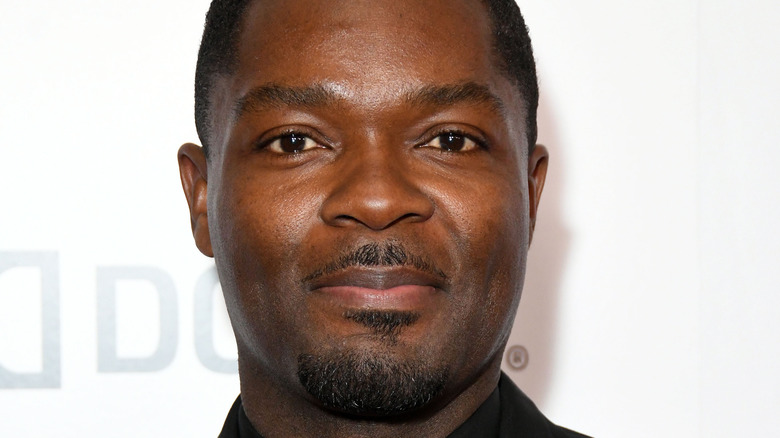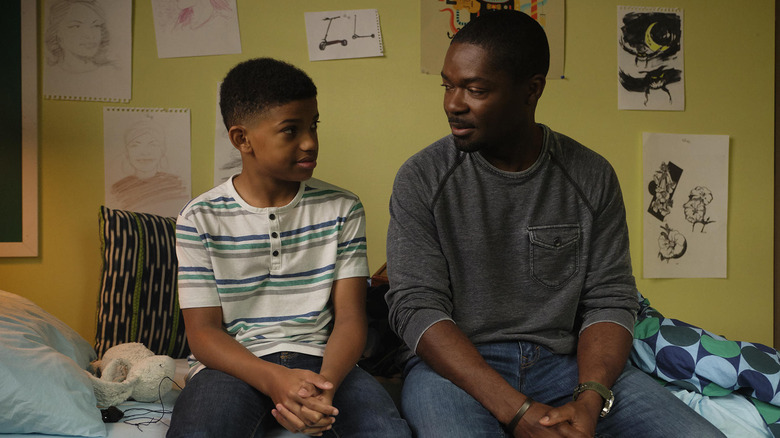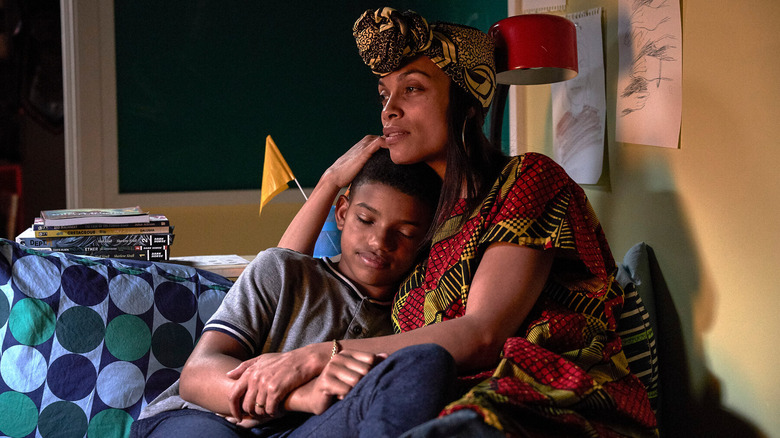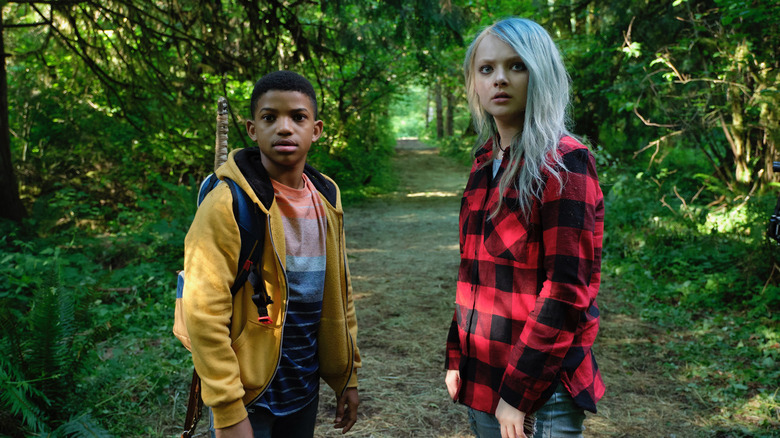How The Water Man's David Oyelowo Really Felt About Working With A Young Cast - Exclusive Interview
If you were a kid growing up in the 1980s, one thing you could consistently rely upon was compelling adventure movies geared seemingly specifically towards you. Steven Spielberg and "E.T. The Extra Terrestrial" set a kind of standard for kids' movies in 1982, and Hollywood spent the remainder of the decade catching up after that. Whether it was a full embracing of the fantasy world like "The Neverending Story" or the treasure-hunting escapades of "The Goonies," the entire decade was an explosive celebration of kids triumphing over adversity.
David Oyelowo, star of "Selma" and one of the best actors working today, was born in 1976, giving him the proverbial golden ticket to explore and enjoy the aforementioned decade's worth of classic kid-friendly storytelling. And now Oyelowo makes his directorial debut with "The Water Man," which represents a return to those bygone days of 1980s adventure movies. "The Water Man" pits a young hero against both a real-life foe and a fantastical entity as both he and the audience seek to understand how a young person can live with the biggest and scariest of issues.
Looper sat down with David Oyelowo to talk about his favorite movies growing up as well as what he learned as an actor and a director while he worked on "The Water Man."
David Oyelowo's childhood influences
"The Water Man" occupies that same space that "E.T." did for me when I was growing up. What movies did you love watching as a kid that may have acted as an inspiration for "The Water Man?"
Well, we share "E.T." as a big favorite. I would add "The Goonies," "Willow," "The Neverending Story," "Gremlins," and "Close Encounters." These are all films that combined reality and fantasy and had kids at the center that had real agency, but they were kids who were also dealing with real-life issues that propelled them into a sort of fantastical narrative. And you know, now that I'm a father myself, I've found myself wondering why those films aren't being made as much, because they are classics for a reason. They sort of grow with you. I watched all of those films recently with my children, and some age better than others, but at the end of the day, at their heart is sort of a universal humanity that just absolutely pummels through racial lines, age lines, time. They're just perennials, and they're classics for a reason. I was looking for something in that hemisphere, and so when "The Water Man" came along, I just knew it was for me.
How The Water Man is similar to '80s movies like E.T.
"E.T." is a great movie. You can enjoy it as a child and not think why, but if you re-watch it again as an adult, you realize that Elliott is dealing with his parents going through a divorce. And here we have "The Water Man," which is about this child dealing with the fact that his mother is dying of leukemia, and it centers on childhood trauma. What was it about this, dealing with childhood trauma in this way, that made you say "This is going to be my directorial debut"?
Well, the reality is, initially, my first encounter with "The Water Man" was as a producer and an actor. I went after it because I really wanted this kind of narrative out in the world again, but I didn't really initially think I was going to be directing it. We actually had a director after a few years of development, but that director left the project to go and do something else. And at that stage, we had already cast Lonnie. We had the money, we had a start date, and those are very tough things to have lined up only for a project to then go away. It was Emma Needell, who wrote "The Water Man," who actually turned to me and said, "David, I think you should be the one to direct it." And I'm so glad she did because maybe I would have felt a little intimidated by it if we didn't sort of have that time crunch element because it's sort of a bigger and more ambitious film than most people would make as their directorial debut. But I was just so passionate about it, and it's for those reasons.
I think that there is a reason why these narratives, where kids are going through something tough, and then their imagination become a sort of coping mechanism — I think there's a universal truth to that. So you're absolutely right about "E.T. "The same thing happens in "The Goonies." These kids are all about to lose their homes and their community, and then they're whoosh, they're up into the fantasy. In "Stand by Me," same thing, the protagonist, who's just lost his brother, he's watching his parents go through a really tough time of bereavement, and whoosh, they're off on the adventure. Disney does so well with "Bambi" and "The Lion King" as well. The protagonists are dealing with tricky familial situations. Pixar does this so brilliantly. You look at films like "Up" and "The Incredibles" and now "Soul." Really existential themes that because they are seen through the eyes of children, or sometimes it's the animation that gives you the excuse to explore these themes without people balking at them. But regardless, when they're done well, when you can thread that needle between the reality and fantasy, they become universal for the whole family. And nothing is better than three generations of a family being able to watch a film together.
What makes the young cast of The Water Man so great
I love that you brought up "Stand by Me," just because you've got such a tremendous group of young actors in that. And I think in an analog to that perfectly is "The Water Man," because you've got Lonnie Chavis and Amiah Miller, and I would really be curious to sort of hear what you felt that they taught you on set.
What they taught me is that professionalism, technical proficiency, and a childlike awe are not mutually exclusive. Sometimes, especially with child actors, they're so technically proficient — for instance, Lonnie was 11 when we shot this film. He could easily be someone who is tough to get a true sense of his 11-year-old self because he's been a professional actor for a while. Well, you totally believe the age he is supposed to be at. You totally believe Amiah is a 13-year-old who starts out very hard-nosed and becomes quite vulnerable. And we were asking them to really engage with scenes that required a high level of emotional intelligence and technical proficiency, but also vulnerability that is tied to the ages they actually were. And some of that stuff you just can't teach, to be perfectly honest. They either have it or they don't. We were just so fortunate to find both of them — and not only that, but for them to also have great chemistry.
Gunner is a comic book artist, and the great thing about comics is that they require that you have to pick these singular images in order to express an idea. And I was wondering, if you were going to look at "The Water Man," if we were going to take a still image, what are those visual images that, for you, are the most striking from the film?
Well, gosh, I think one of the most striking images for me is the encounter of the, and I'm probably giving too much away here, but I'm going to say it anyway. It's the encounter Gunner has with the Water Man. And it's a real David and Goliath moment, and in some ways, it typifies in a visual, the task that Gunner has taken on, and how much love he has for his mother, because for an 11-year-old kid to go up against that insurmountable journey, and the notion of this mythical figure, really illustrates just how much he loves her.
"The Water Man" is in theaters beginning May 7, 2021.



